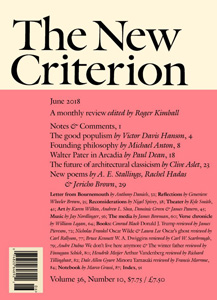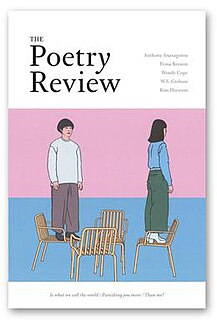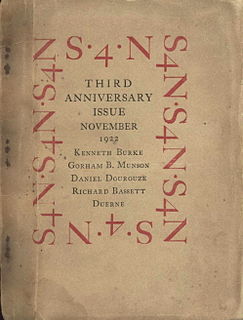Related Research Articles

Robert Laurence Binyon, CH was an English poet, dramatist and art scholar. Born in Lancaster, England, his parents were Frederick Binyon, a clergyman, and Mary Dockray, he studied at St Paul's School, London. at Trinity College, Oxford, where he won the Newdigate Prize for poetry in 1891. He worked for the British Museum from 1893 until his retirement in 1933. In 1904 he married the historian Cicely Margaret Powell, with whom he had three daughters, including the artist Nicolete Gray.

David Garshen Bomberg was a British painter, and one of the Whitechapel Boys.

This article focuses on poetry from the United Kingdom written in the English language. The article does not cover poetry from other countries where the English language is spoken, including Southern Ireland after December 1922.
Georgian Poetry refers to a series of anthologies showcasing the work of a school of English poetry that established itself during the early years of the reign of King George V of the United Kingdom.
Modernist poetry in English started in the early years of the 20th century with the appearance of the Imagists. In common with many other modernists, these poets wrote in reaction to the perceived excesses of Victorian poetry, with its emphasis on traditional formalism and ornate diction. In many respects, their criticism echoes what William Wordsworth wrote in Preface to Lyrical Ballads to instigate the Romantic movement in British poetry over a century earlier, criticising the gauche and pompous school which then pervaded, and seeking to bring poetry to the layman.

The New Criterion is a New York–based monthly literary magazine and journal of artistic and cultural criticism, edited by Roger Kimball and James Panero. It has sections for criticism of poetry, theater, art, music, the media, and books. It was founded in 1982 by Hilton Kramer, former art critic for The New York Times, and Samuel Lipman, a pianist and music critic. The name is a reference to The Criterion, a British literary magazine edited by T. S. Eliot from 1922 to 1939.
John Edgell Rickword, MC was an English poet, critic, journalist and literary editor. He became one of the leading communist intellectuals active in the 1930s.
Thomas Moult (1893–1974) was a versatile English journalist and writer, and one of the Georgian poets. He is known for his annual anthologies Best Poems of the Year, 1922 to 1943, which were popular verse selections taken from periodicals on both sides of the Atlantic.

The Egoist was a London literary magazine published from 1914 to 1919, during which time it published important early modernist poetry and fiction. In its manifesto, it claimed to "recognise no taboos", and published a number of controversial works, such as parts of Ulysses. Today, it is considered "England's most important Modernist periodical."
The Little Review, an American literary magazine founded by Margaret Anderson, published literary and art work from 1914 to May 1929. With the help of Jane Heap and Ezra Pound, Anderson created a magazine that featured a wide variety of transatlantic modernists and cultivated many early examples of experimental writing and art. Many contributors were American, British, Irish, and French. In addition to publishing a variety of international literature, The Little Review printed early examples of surrealist artwork and Dadaism. The magazine's most well known work was the serialization of James Joyce's Ulysses.
— Wilfred Owen, concluding lines of "Dulce et Decorum est", written 1917, published posthumously this year
Poetry London is a leading London-based literary periodical which publishes poetry, reviews and features three times a year.

Poetry Review is the magazine of The Poetry Society, edited by the poet Emily Berry. Founded in 1912, shortly after the establishment of the Society, previous editors have included such poets as Muriel Spark, Adrian Henri, Andrew Motion and Maurice Riordan.
Chicago Review is a literary magazine founded in 1946 and published quarterly in the Humanities Division at the University of Chicago. The magazine features contemporary poetry, fiction, and criticism, often publishing works in translation and special features in double issues.

Russian Ballet is an artist's book by the English artist David Bomberg published in 1919. The work describes the impact of seeing a performance of Diaghilev's Ballets Russes, and is based on a series of drawings Bomberg had done around 1914, while associated with the Vorticist group of avant-garde artists in London. Centred on Wyndham Lewis and Ezra Pound, the movement flourished briefly 1914–1915, before being dispersed by the impact of the First World War. The only surviving example of a vorticist artist's book, the work can be seen as a parody of Marinetti's seminal futurist book Zang Tumb Tumb, using similar language to the Italian's work glorifying war, but instead praising the impact of watching the decidedly less macho Ballets Russes in full flow.
Bomberg was the most audacious painter of his generation at the Slade, proving ... that he could absorb the most experimental European ideas, fuse these with Jewish influences and come up with a robust alternative of his own. His treatment of the human figure, in terms of angular, clear-cut forms charged with enormous energy, reveals his determination to bring about a drastic renewal in British painting. —Richard Cork

The Lone Hand was a monthly Australian magazine of literature and poetry published between 1907 and 1928. The magazine was based in Sydney.

X, A Quarterly Review, often referred to as X magazine, was a British review of literature and the arts published in London which ran for seven issues between 1959 and 1962. It was co-founded and co-edited by Patrick Swift and David Wright.

S4N is an American "little magazine" that was published from 1919–1925 in Northampton, Massachusetts. In its earliest stages, editor-in-chief Norman Fitts described the magazine as a "discussion of the arts in a monthly magazine". The magazine published contemporary poetry and stories, as well as essays discussing the direction of Modernism in art and music. Among the notable poets, writers and literary theorists that were published in the magazine were E.E. Cummings, Hart Crane, Kenneth Burke, and Malcolm Cowley. In The Little Magazine: A History and Bibliography, Frederick J. Hoffman's authoritative work on little magazines, contends that S4N, along with Broom, Secession, and Seven Arts, were trend-setters and leaders of innovation.
Henderson's, better known as The Bomb Shop, was a bookshop at 66 Charing Cross Road, London known for publishing and selling both radical left and anarchist writing and modernist literature. The shop was founded in 1909, and was a father and son operation run by Francis Riddell Henderson, formerly the London representative of Walter Scott Publishing. The shop was bought by Eva Collet Reckitt, and became the first of the Collet's chain of left-wing bookshops.
John Clive Hall was an English poet and editor.
References
- 1 2 3 4 Morrisson, Mark S. (2009). "Thomas Moult and Voices (1919-21), Harold Monro and The Monthly Chapbook (1919-25)". In Peter Brooker and Andrew Thacker (ed.). The Oxford Critical and Cultural History of Modernist Magazines:Volume I: Britain and Ireland 1880-1955. Oxford: Oxford University Press. pp. 405–427. ISBN 978-0-19-921115-9 . Retrieved 26 August 2012.
| This article about a literary magazine published in the United Kingdom is a stub. You can help Wikipedia by expanding it. See tips for writing articles about magazines. Further suggestions might be found on the article's talk page. |